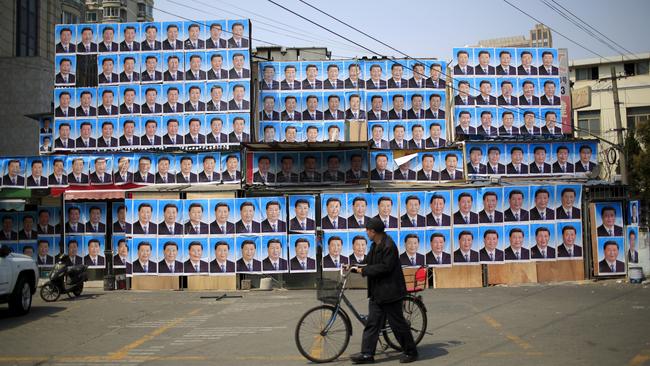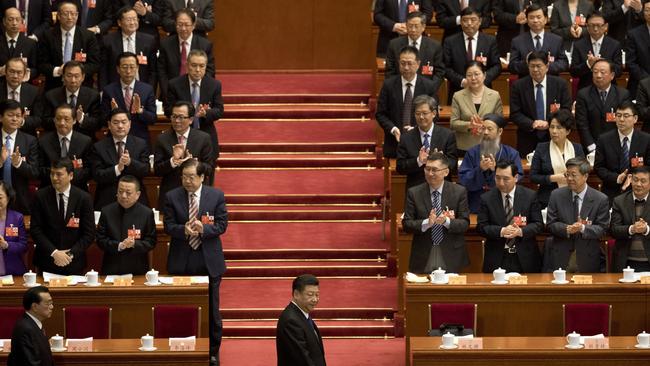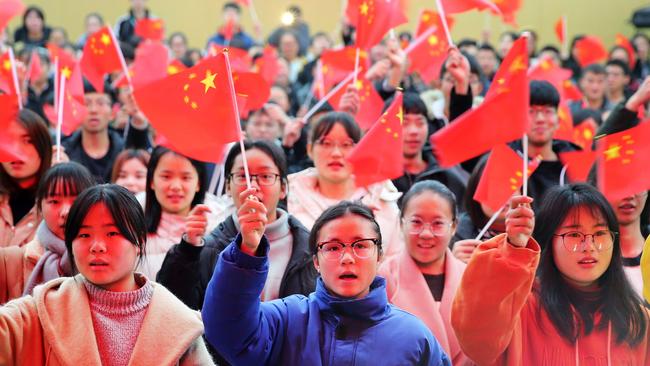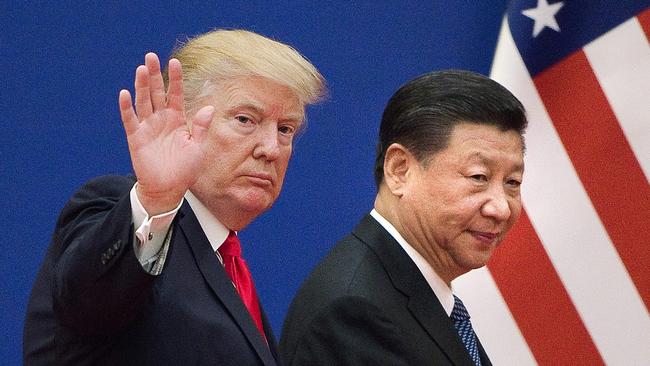Welcome to the dynasty of Xi Jinping
Xi Jinping’s goal is nothing less than to reshape the world. And he is succeeding. The West has seen nothing quite like this.

There can be no doubt about which world leader has lured the most attention this year. But win or lose, there’s only so much Donald Trump can achieve, or mess up, given constitutional constraints in the US, including the separation of powers.
The figure who really is gambling all — self, party, nation — on vaulting into global dominance, we have discovered this year, is China’s President Xi Jinping. He is the true man of the year — and, if he succeeds, of the decade and beyond. For his goal is nothing less than to reshape the way the world works. And he is succeeding step by step, despite one or two inevitable setbacks en route.
The signs of his stunning ambition increasingly were being identified by China watchers but became widely recognised, inside the country and worldwide, only when the National People’s Congress in March abolished term limits on the presidency.
The limit of two five-year terms had been introduced by Deng Xiaoping to restrain the power of leaders after Mao Zedong’s Great Leap Forward and Cultural Revolution mania had all but destroyed the Chinese Communist Party and the country. Now Xi — who, aged 65 and in the top job for six years, has not started lining up a potential successor — can and likely will continue ruling for a further decade or more.
He decided to cement his future at the top before “events” — such as a trade war — could create roadblocks and before opposition could coalesce. It was a calculated risk that has paid off, at the price of some resentment among party members, but they have nowhere else to turn.
This week, China has celebrated the 40th anniversary of the Deng-driven era of reform and opening that has helped deliver the nation its remarkable prosperity. But Xi recently re-enacted Deng’s “southern tour”, which electrified the country’s southern industrial powerhouse, without mentioning his name.
This is no longer Deng’s old era. To underline that fact in triplicate, Xi’s own “thought on socialism with Chinese characteristics for a new era” has been written into party and state constitutions — with an emphasis on this being a new golden era.
This is the era of the personalisation and centralisation of power, in the name of “rejuvenating” party and state — cleansing them, in theory at least, of disloyalty and of corruption, with a huge new Supervisory Commission established outside the court system to pursue that goal. As an unintended consequence, though, this campaign has broken up many networks of trust that had driven business activities for decades.
Xi grew up in Zhongnanhai, the party headquarters compound, the new forbidden city immediately west of the ancient Forbidden City that was the heart of the previous imperial dynasties.
Although his family was cast out into the countryside near Xi’an during the Cultural Revolution, when he was a teenager, Xi never blamed Mao or the party. Instead, he developed the capacity to strive for long-term goals and to shield the extent of his ambition until, step by inexorable step, it was accomplished.
Foreigners, especially overseas political leaders, mostly fail to comprehend Xi because they view him from within their own contexts of manoeuvring and pragmatism, imagining that he is cleverly playing factions off against each other or seeking to satisfy People’s Liberation Army eagerness by playing the nationalist card.

He does not think or operate like that. He is utterly sincere, a true believer like no other international figure of our era, which is becoming his era. For Xi, China represents the culmination of the world’s civilisations, the party of which he is general secretary encapsulates all that is best of China’s past, present and future, and he personifies uniquely the verities of the party.
This week, to the 3000 officials gathered in the Great Hall of the People to mark the anniversary of the launch of China’s reform and opening, he explained the true lessons to be learned from those 40 hectic years.
He did so in a manner that might have appeared baffling without considering the crucial context of Xi’s world view: “First, the party’s leadership over all tasks must be adhered to, and the party’s leadership must be incessantly strengthened and improved.”
He said: “It was precisely because we’ve adhered to the centralised and united leadership of the party that we were able to achieve this great historic transition.” The party’s socialist path had been “totally correct”, he declared. “Let contemporary Chinese Marxism shine even more brilliant rays of truth.”
He previously has stated: “East, west, south, north and the middle, the party leads everything.” He has told China’s journalists their “surname is Party”.
It was right, he said on Tuesday, for a country of China’s stature to hold “lofty ambitions”. It would not “abandon its own legitimate rights and interests”.
Xi also honoured 100 pioneers of reform, including Jack Ma, founder of one of China’s great new globalising forces — online giant Alibaba. Ma, it was revealed recently, is a party member.
Xi’s version of socialism, while strongly backing the state sector that continues to drive China’s upstream economy, is no longer wedded to ownership of the means of production as long as the private sector champions contain significant party branches and leaders such as Ma who are capable of guiding the firms appropriately as required. All foreign corporations operating in China also are expected to host party branches.
When Xi emerged as general secretary in 2012, he was viewed as a consensus kind of guy similar to his immediate predecessors. This view proved to be totally wrong. Instead, Xi has destroyed all rivals: individuals, families, power blocs and factions.
China is far too large and regionalised — the only country of its size that is not governed federally — and its population is too individualistic and too well educated for all criticism, all opposition, to be excised completely. But the vast state resources applied to hi-tech surveillance and the resulting capacity to exercise control, often in a viscerally low-tech manner, have given Xi a huge advantage over his predecessors or potential successors.
In this new era, Xi wants China’s economic heft to be reflected in international influence and respect, and in a capacity to transform global institutions to better suit the country’s ambitions.
As prosperity has become more routine, Xi has needed to develop this fresh channel of legitimacy for party rule. China’s population is travelling, studying and investing globally, and Xi is assuring them that Beijing will promote and protect them and their interests in full.
Last year, indicating both anxiety and confidence about “going out”, a patriotic Chinese Rambo-style movie, Wolf Warrior 2, smashed box-office records. The film’s slogan, adapted from a Han Dynasty saying, is: “Whoever offends China will be punished, no matter how far they are.”
After Xi emerged as party chief in 2012, he appeared to have an open face. This expression shifted towards a Buddha-like self-containment, and then by the time of the party’s national congress last year, a more palpable disinterest.

When, as happens almost nightly, Xi is shown on television with foreign leaders, they often are filmed entering the Great Hall and walking down an interminable red carpet while he awaits them with a special expression he has cultivated, one of distance and reserve.
Those foreign leaders, awed by the environment, often will bow as they face Xi. He does not step towards them or bow in return. He rarely eyeballs them during the inevitable ensuing handshake. Chinese TV viewers are put in mind of ancient tribute-state relationships.
Asian concerns over Trump’s reliability are reinforcing Xi’s hand. Japan’s durable leader, Shinzo Abe, recently described relations with China as “completely returned to a normal track”. South Korea’s Moon Jae-in concurs. Xi even succeeded in prising a significant stake in the North Korean saga, twice summoning Kim Jong-un — best known in China as Jin San Pang, Fatty Kim the Third — to meetings in China that helped frame the Singapore deal with Trump.
Xi has fostered friendships with Recep Tayyip Erdogan in Turkey, Ali Khamenei in Iran and Vladimir Putin in Russia. He invested Putin, in the Great Hall, with China’s first Friendship Medal, declaring him “my best, most intimate friend”.
The Chinese President has modernised the People’s Liberation Army, restructuring its command to reflect capabilities, not geographical areas; cutting its size by 300,000 to two million; and establishing overseas bases, the first in Djibouti, and patrols of distant oceans, as far as the Baltic Sea. The South China Sea is now in effective Chinese control.
Xi also is boosting China’s diplomatic resources, doubling foreign affairs spending in five years — in contrast to the US, which last year cut such spending by 30 per cent. Last year Xi formally launched his signature Belt & Road Initiative; this year he established China’s first aid agency, tasked with better serving “China’s diplomacy and the BRI”.
The trillion-dollar BRI is acting as a great magnet for countries short of capital and infrastructure. It is being engineered so that not only all roads but also all rail, air and sea routes, all compliance arrangements and technical standards, all telecommunications carriers, all leading internet platforms, lead not to Rome, as of old, but to Beijing as Eurasia’s connectivity hub.
China has convinced the UN’s 47-member Human Rights Council to accept as its new template Xi’s formula of “a community of shared destiny for human beings”, governments choosing their own paths rather than upholding universal values.
How is Xi changing China?
He is channelling urbanisation into China’s second and third-tier cities and is building a new metropolis, Xiong’an, for 12 million people 100km from Beijing.
Xi is taking strong steps to reverse China’s heavy degradation of air, soil and waterways.
Reducing greenhouse gases is a secondary spin-off from this popular priority.
Despite China hosting last month its first great Import Expo in Shanghai, Xi still wants to replace foreign involvement in all key tech sectors, via the Made in China 2025 project. Today, China spends more on importing semiconductors than it does importing oil.
Can Trump’s trade war change the terms with which China’s economy — through which it has weaponised its globalisation — relates to the world?
The economy remains the core point of vulnerability for Xi and the party.
Chinese households have less ability to weather an economic downturn or drive domestic demand than is widely believed. Beijing continues to aim towards “moderate prosperity”. This is not some kind of false modesty — China still has to burst through the “middle income trap” that has held down so many economies, with the famous exceptions of its East Asian neighbours.
But compared with the audacity of the political restructuring and personalisation, no sudden economic shift is to be expected in Xi’s new era.
Leading economic analyst Arthur Kroeber says China has entered a post-economic-reform era, in which the party has returned to its former position that it is best placed to price risk. It is thus punting heavily on artificial intelligence and on making China 5G Central.
Xi’s era is one of centralisation of decision-making, restructured around party commissions, such as on security and on the internet, six of which Xi chairs. These effectively have replaced the Politburo Standing Committee as the locus of real power.
But little is known about the personnel or the processes around the commissions. Xi recently chaired the central auditing committee — there appears no technical area that he believes to lie beyond his grasp.

Xi views government workers essentially as hired help, and this year has dragged many important areas from government to direct party control.
Shanghai academic Chen Danyin says: “The decision-making role of the State Council will dwindle, it’s the logic of a Leninist state.”
Xi has identified preventing financial risks, reducing poverty and inequality, and tackling pollution as China’s “three tough battles”. He has warned against seven deadly sins: to promote constitutional democracy, universal values, civil society, economic neoliberalism and the Western concept of a free media; to deny the party’s official narrative of history; or to question the nature of Chinese socialism.
Little happens in China without the authorities’ knowledge. In the “real world”, each 200 Chinese households are monitored closely by a security manager via the “grid management” system. Online, Xi has transformed the internet into a great tool of control in the name of “cyber sovereignty”.
Under the emerging “social credit” system, people who jaywalk or smoke on trains, for instance, risk being tagged by CCTV and facial recognition software, and may be banned from travelling, forbidden state jobs or denied promotion, while those who act worthily will gain advantaged “green channel” access to jobs, travel and leisure.
The State Administration of Press, Publication, Radio, Film and Television — this year brought under the party’s propaganda department — wants film and TV producers to showcase “people’s happiness”. Crime stories need approval from the Public Security Ministry and should not contain details. Gay characters, tattoos, “flirtatious” dancing and perceived violations of “mainstream values” are all forbidden on media. The State Administration advises: “To avoid the risk of being censored, ask friends to review your work first.”
Xi urges all educational institutions to nurture young people in the socialist cause. During a kindergarten visit, he told children to love the party and to “pass on the revolutionary gene”. He frequently brandishes his own red genes — son of a vice-premier — as a key element in his legitimacy as leader. Many universities recently have opened Xi Jinping Thought Centres.
Xi has smashed domestic dissent, including through the nationwide overnight arrest of hundreds of lawyers and their staff whose practices had focused on rights cases. Most are now in jail or under house arrest.
The marginalised — potential “troublemakers” — thus have lost their key intermediaries, while China’s embryonic civil society, which briefly flourished following the Sichuan earthquake a decade ago, is cowed and in retreat.
In Xinjiang, up to a million Uighurs have been detained in new re-education camps, constructed and staffed within a single year. If both parents are in custody, their children are sent to re-education centres for “special children” and forbidden schooling with “normal” children.
As Christmas approaches, Xi’s insistence that all religions are “Sinicised” — activities, beliefs and traditions to reflect Chinese culture, as encapsulated in that of the Communist Party — has encouraged zealous cadres to close down some of the country’s largest churches, including Early Rain in Chengdu and Zion Church in Beijing, taking leaders and followers into custody.
Places of worship are expected to accommodate surveillance cameras and services must include singing of the national anthem.
Belt & Road excesses have helped Xi’s critics find at last some ground from which to fire back, following his blitzkrieg of change. Some are angry about the waste of money, about the risks Xi has taken in seeking global glory before China has become rich enough to fuel a real challenge to the US, and about his own abolition of term limits.
The party member parents of a Chinese friend, previously strong Xi supporters, rolled their eyes as Xi headlined the TV news during the friend’s recent home visit.
Trump’s trade war has underlined this anxiety. A recession in the US might turf out an administration; in China, party members worry that the whole dynasty needlessly is being put at stake.
Jude Blanchette, a leading party analyst for the Crumpton Group in the US, says Deng’s strategy for China to hide its strength and bide its time had “allowed China to pursue wealth and power in a way that stayed below the radar”. By casting that off so forcefully, Xi has “exposed China to many of the global forces it’s now being battered by”.
But Xi’s authority is immense, and his extension of disciplinary machinery enables dissenters to be dealt with swiftly.
Some observers have suggested that the party inserted a strong man to purge and clarify as China seemed to be losing its way, and that it could sideline him now if it felt he had gone too far. The alternative view is simply that Xi has taken over the party, is remoulding it and can’t be stopped. Without evidence of influential opposition, the latter seems more persuasive.
Top Australian Sinologist Geremie Barme summarises the Xi zeitgeist as: “We’re here; we’re mean; get used to it.”
Internationally, concern is growing about China’s rapidly rising influence.
Most significantly, in rare unanimity, the US establishment now seems determined to shed what James Mann described 11 years ago in The China Fantasy as “an elaborate set of illusions about China, centred on the belief that commerce will inevitably lead to political change and democracy”. That fantasy helped fuel China’s rise.
However, Xi — who possesses in spades that key attribute for political success, luck — continues to build authority and capacity at home and in many corners of the world where the influence of the West is fading fast.
Man of this year, and maybe many more.
Rowan Callick is a former long-serving China correspondent for The Australian.



